World Chess Championship 2023: Reactions, Statistics, and Impressions
A look back at the 2023 Chess World Championship
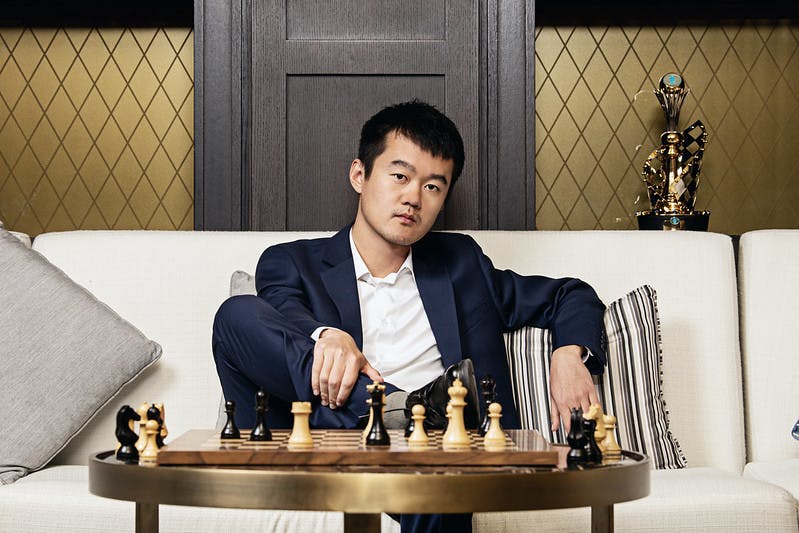
It’s been just under a week since Liren Ding became the (undisputed) 17th Chess World Champion, in a spectacular victory over Ian Nepomniachtchi. In the fourth and final rapid tiebreak, Ding, playing with the black pieces, declined a repetition and instead played the iconic 46… Rg6!?, dubbed by Magnus Carlsen as a “self-pin for immortality”.
The move took much of the chess community by surprise – seemingly including Nepomniachtchi – who widely assumed Ding would repeat the position. There was some speculation that Nepomniachtchi had not even considered Ding would play the move.
In cinematic scenes, Nepomniachtchi’s shock was clear as a few moves later he fumbled and knocked over chess pieces before offering Ding his resignation. Ding’s relief was clear as he immediately slumped over the board, hiding his face as the moment sank in – before in shock shaking Nepomniachtchi’s hand again.
Despite Ian Nepomniachtchi's best efforts, he fell short of his ultimate goal. However, his many qualities - including innate skill, erudition, creativity, unconventionality, and daringness - make him an inspiring player who has captured the hearts of many. He will be back. pic.twitter.com/F2grulX5hp
— Olimpiu Di Luppi (@olimpiuurcan) May 2, 2023
Ding did not qualify for the 2022 Candidates, and it was pure luck he ended up playing it. Sergei Karjakin’s vocal support for the Russian invasion of Ukraine resulted in a six month ban from FIDE events, and therefore his removal from the 2022 Candidates Tournament. Ding took Karjakin’s place, and after a rocky start finished in second place – a strong result, but not good enough to play the World Championship, where only first place becomes the Challenger.
However, fortune again favored Ding as the 16th World Champion, Magnus Carlsen, announced his abdication from the Classical title. As a result, Ding, as the second placed finisher in the 2022 Candidates, qualified to play the Challenger – Ian Nepomniachtchi – to determine the new World Champion.
Prior to the match, Ding had been considered to be somewhat of an underdog – although least so by the Lichess Mastodon community who thought the match up was pretty equal (clearly showing the supremacy of FOSS communities :P).
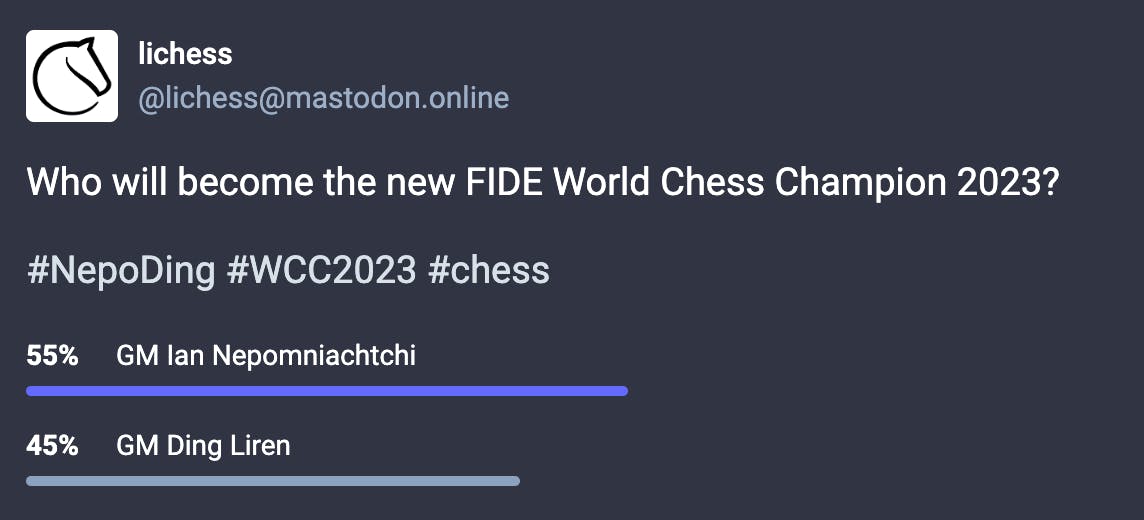
Although historically very stable and consistent, his 2020 Candidates results were shaky – and his form seemed to clearly decline following a period of inactivity during the Covid pandemic. A poor performance in 2023’s Tata Steel at Wijk aan Zee made many suggest he was underprepared and had lost his historical consistency.
Ding later shared that he only began preparing for the World Championship following Tata Steel – a very short period of time to prepare at the elite level – and chose Richard Rapport as his second after playing some games against him online. Rapport joined Wei Yi, a friend and long-time collaborator with Ding who had been providing remote seconding support.
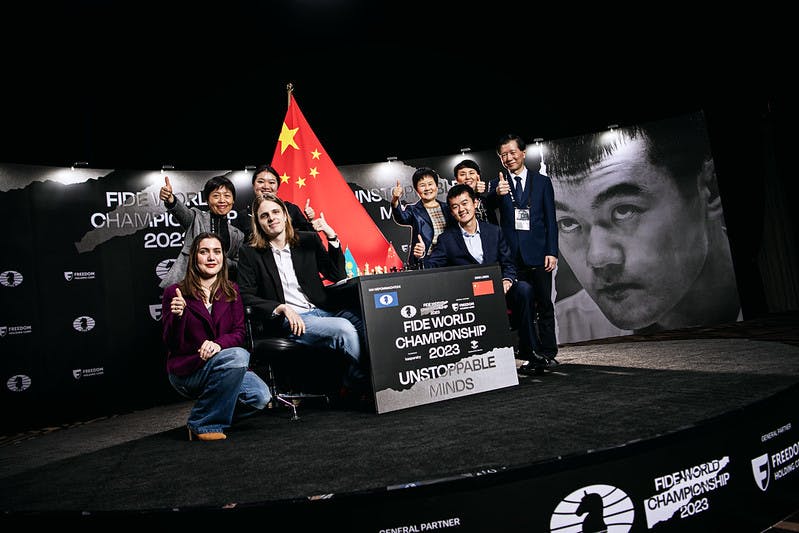
At the start of the World Championship, Ding was frank about his anxiety, depression, and fears he felt, causing him to freeze up in Game 2. He later shared that had he lost the World Championship, he was considering retiring from chess – such was the pressure he felt.
Despite this internal psychological battle, Ding fought back tenaciously over the board – apparently inspired by the philosophy of Camus (“if you can’t win, you have to resist”). Tragedy struck again midway through the tournament, as his online preparation games against Richard Rapport were allegedly discovered – an oversight that never would have happened had unrated games been played instead. Ding highlighted that whilst he initially did not feel worried about it, he later realised “it left them with no real ideas, so they had to come up with new ones” mid-tournament.
It is difficult to overstate how catastrophic revealing prep can be, especially midway through a critical tournament. Nepomniachtchi’s team included Kramnik, Tomashevsky, and Matlakov – a formidable and experienced team who undoubtedly pored over the opening ideas and quickly found ways to rebuff them.
As a result, Ding moved out of prep quickly and played offbeat openings to avoid Nepomniachtchi’s deep preparation. By the end of the match, Ding had adapted and begun finding safe counters to Nepomniachtchi’s Ruy Lopez, and in a Hollywood ending, showed unbelievable mental resilience and fortitude to overcome his struggles and win the World Championship title.
A similar analogy in another sport for the impressive nature of what Ding overcame and the struggles he pushed through – are similar, perhaps, to beating Nadal on clay for the Roland Garros final, while playing with a loose racquet and a sprained ankle.
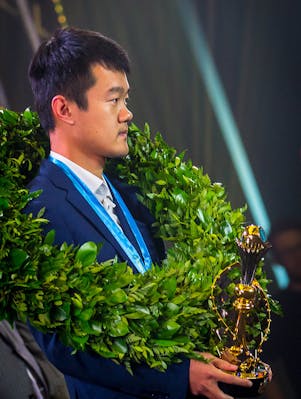
Exclusively for Lichess, GMs David Navara and Harikrishna Pentala gave detailed thoughts and annotations of every single classical game. Missed it at the time? The full link will always be available here.
The games were not played as accurately as previous World Championships:
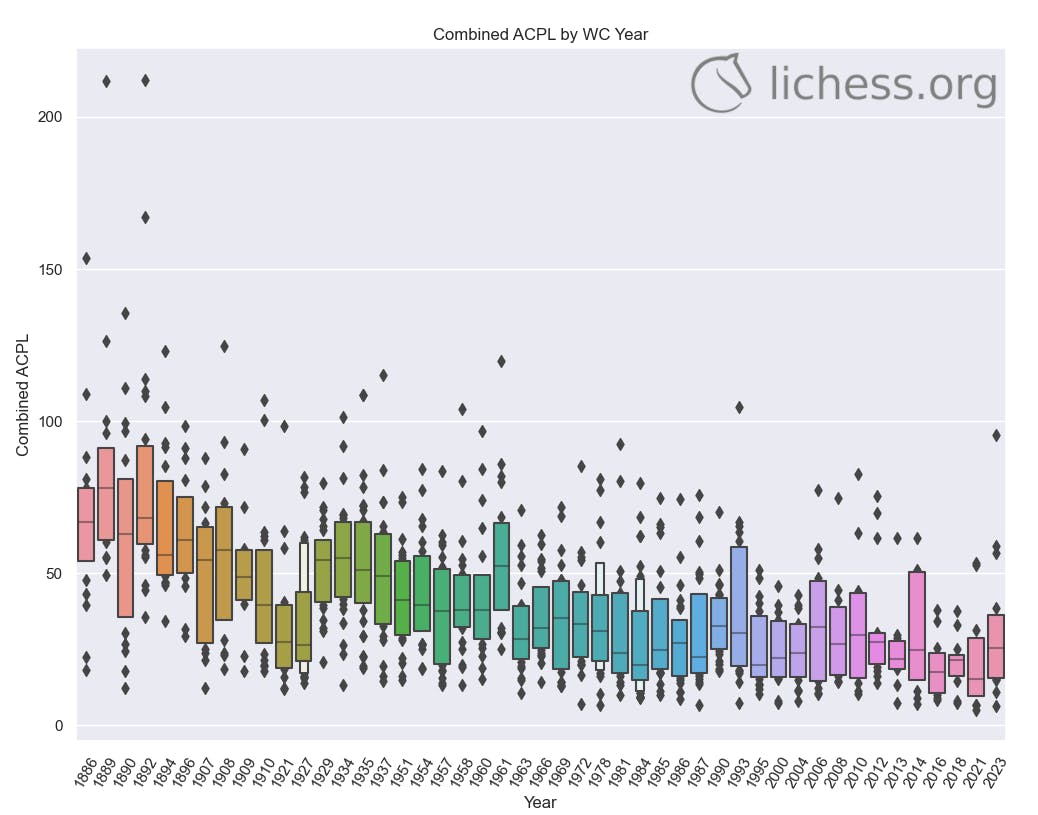
The boxes show the average range of accuracy, with the dates corresponding to the World Championship played that year. The diamonds aligned vertically show the outliers at both extremes.
Some of that is undoubtedly due to unusually inaccurate play, with nerves affecting both players. But equally, both were willing to play inaccurately to force their opponent into complex positions that had a chain of single moves to maintain or keep the advantage. While these are inaccuracies at the engine level, tactically they can provoke greater errors from an opponent if they cannot find the only good line in a very pressured scenario. Equally, Ding avoided deeply analyzed openings, taking advantage of oversights in Nepomniachtchi’s preparation – for example Ding scored 2 / 2 with white in the London and Colle systems – openings that an engine with an opening book will not be impressed by.
Ultimately, Ding’s calculation and raw chess intuition was stronger than Nepomniachtchi, who also succumbed to blitzing out questionable moves in complex positions. This was highlighted by us in our preview article as a historic weakness of Nepomniachtchi, having now cost him several high-stakes games.
The chess community, including former World Champions, were quick to praise Ding with Magnus Carlsen, Viswanathan Anand, and Garry Kasparov tweeting congratulations:
Self-pinning for immortality. Congrats Ding!! https://t.co/pswA5g6bz9
— Magnus Carlsen (@MagnusCarlsen) April 30, 2023
Congratulations to Ding Liren, the first Chinese World Champion! @FIDE_chess #NepoDing
— Viswanathan Anand (@vishy64theking) April 30, 2023
First off, congratulations to Ding Liren on his victory. Welcome to our very, very small club! 2/8
— Garry Kasparov (@Kasparov63) May 1, 2023
The international media also quickly wrote about the match's dramatic conclusion, with very interesting interviews from the players coming particularly from Leontxo Garcia of El Pais, and Sean Ingle of The Guardian.
My interview with Ding, in English. What a fascinating champion! https://t.co/lkHiPFNHuz#Chess #NepoDing
— Leontxo García (@leontxogarcia) May 2, 2023
Spoke to Ding Liren and Ian Nepomniachtchi about their epic world chess title match. Ding exhausted. Nepo on great form - but revealed how he'd not slept all night before tie-breaks as his sleeping pills were taken. Will tweet a few more chess bits below
— Sean Ingle (@seaningle) May 2, 2023
https://t.co/1B4dndjqFu
While the match was broadcast on CCTV (China Central Television), the media attention and social media interest was surprisingly muted - despite China currently having both the Open and Women's World Champion in chess. This is an unusual achievement, last occurring with undisputed World Champions in 1991 with two players from the USSR: Maia Chiburdanidze and Garry Kasparov (Antoaneta Stefanova and Veselin Topalov also achieved this for Bulgaria in 2005, but this was during the FIDE/PCA split).
However, crowns are heavy – and from early interviews it seems Ding is a philosopher king – aware of his responsibilities and role as an ambassador for chess to the world. It is surely only a matter of time until China understands the possibility they have open to them, with Ding and with chess.
Photo credits FIDE / Stev Bonhage / Anna Shtourman